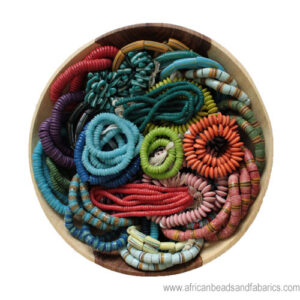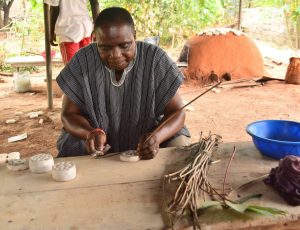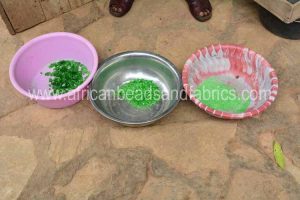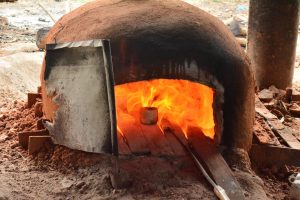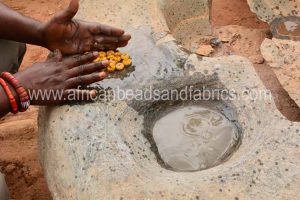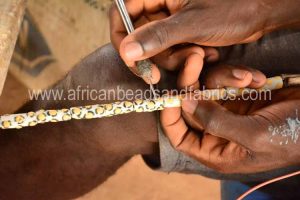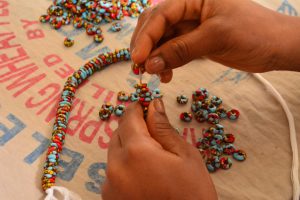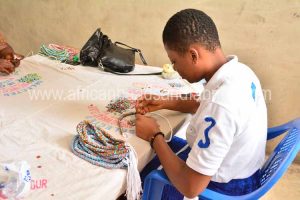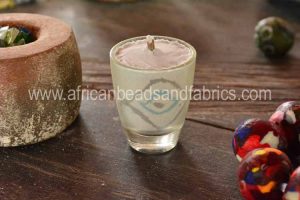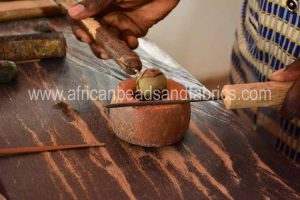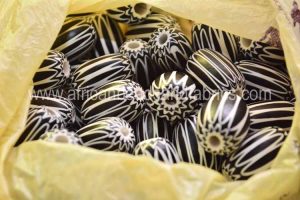Introduction
Recycled glass bead production is predominantly done by the Krobo people who live in the south-eastern part of Ghana,occupying the eastern lower foothills of the Akwapim ranges and spread beyond the mountains to the east and west, reaching parts of the Volta River estuaries in the Eastern Region. Major towns in this region include Kpong, Agomanya, Somanya, Dodowa , Manya-Krobo, Odumase-Krobo and Akuse.
Bead making among the Krobo is highly regarded and one can find several micro and medium production plants located in Krobo towns, villages and hamlets. Bead making involved people of all ages. Many people in this area learn bead making skills from childhood from family members engaged in the trade and some proceed further by engaging in apprenticeships.
In addition to the many small and medium scale bead producers, there are a few large scale producers. From one of these we source most of our beads, although our stock also includes purchases from small-scale bead-makers. It is from our visits to the two biggest bead businesses that we gleaned the information on how recycled glass beads are made.
Founded 20 years ago by and husband and wife of the Krobo tribe in Ghana, one of them produces mainly transparent, powdered glass beads and painted glass beads. Also on offer from their “factory” (which in fact is a compound in their home) also offers training in bead making/production and marketing and serves as a tourist attraction. Products are marketed both locally and internationally through large and small orders by several vendors, and to tourists who visit the production facility.
Going Green
In collaboration with the Netherlands Embassy in Ghana, is currently exploring the design and use of gas-fired ovens in a bid to stop using firewood. A breakthrough will assist in reducing or even eliminating altogether the use of firewood with undesirable consequences for the environment. In the meantime, he has integrated cultivation of woodlots into his business and grows all the firewood he uses.
Our second bead-maker, C Djaba, started the craft at the age of seven under the guidance of his parents. He went to school in the morning and made beads in the afternoon. His facility is located in a rural environmentally friendly location filled with production sheds and rooms, a lecture shed, a showroom and shop intermingled with palm and tropical trees, and residential facilities.
He offers bead making/production training and marketing. His “factory” serves as a tourist attraction and also gives lectures/lessons at various levels of education in-country and abroad. A host of students and Lecturers have come and continue to come to him business for research, internships and attachments.
Products are marketed both locally in Ghana and internationally through large and small orders, and tourist who visit the production facility to learn about the bead production process. Practical demos of the beads making process are offered at clients’ request.
Several different kinds of beads are made here including;
- recycled antique beads,
- recycled transparent beads,
- glazed beads and the
- “Bodom” beads.
The methods for making these glass beads are widely known among the Krobos and other parts of Ghana.
Glass Bead-making Process
The illustration of bead making techniques shared in this section and video is as captured during a demonstration.
Transparent Glass Beads
The glass materials are washed to get rid of labels, alcohol, etc and dried.
They are then crushed on a piece of rock placed in a semi-enclosed wooden box with a hammer.
The crushed glass is then sifted into various degrees of finess.
The sorting sizes are determined by the sizes of beads to be made and hence the appropriate clay molds. For transparent beads, sieved sizes must be large.
- washed glass bottles ready to be made into beads
- sieving to desired fineness
- Broken glass of different fineness
The crushed glasses are then poured into clay moulds and placed in wood fired clay ovens at high temperatures and removed when molten. Most are heated just enough to fuse, giving them a grainy texture.
- filling the moulds is painstaking work
- glass powder in moulds
- at the heart of glass bead-making is the kiln
Holes are made in the hot beads and expertly shaped. The beads are left to cool and readied for the refinery.
The traditional refinery is a large igneous rock that has a curvature into which the beads are placed. Sand and water are added to enhance washing and smoothing of the beads.
- washing and drying
- ready to be decorated
- painting the beads
Locally made machines (the tumbler) are used to enhance refinery efficiency.
- stringing beads provides employment for young women
- an equally important part of the process
- stringing is the last stage in bead-making
Powder Glass Beads
Very small glass pieces produced as a result of the crushing process are further pounded in a motar with a pestle to produce powdery pounded glass material and further sieved. A selected dye is added to the glass powder and mixed to obtain the color of choice. Clay molds with dried cassava stalks inserted in them are filled with the fine powder and placed in the high temperature ovens.
These cassava stalks burn away and thus create holes in the beads as they are removed from the hot ovens. The beads are strung onto bicycle spokes or kebab steaks and art works or designs in various colours are carefully drawn on them.
The spokes strung beads are allowed to dry and sent back to the oven for the colours of the embellished patterns to merge with the core glass material. The beads are then given a final wash and are ready to be strung into design jewelry, etc., for use or sale as desired.
The main ingredient or material for bead making at Cedi Beads is glass and the method of beads making is the same as described above. It is important to note that not all glass is compatible and may require testing. The pyrometer is used to test compatibility of various forms of glass to prevent beads falling apart.
Recycled beads stay in the oven or kiln for 30mins – 45mins at high temperature and left for cooling for a minimum of one hour upon removal from the oven.
Other Types of Bead
“Bodom” Beads
“Bodom” beads are among the most skillfully made beads from fine glass powder and worn mostly by chiefs as part of their regalia. “Bodom” beads are mostly made in medium to large sizes. They are made at oven temperatures of 600o – 800o over 20 to 35minutes.
- Making Bodom bead
- taking out a bodom bead out of mould
- Chevron beads
Modern Chevron (antique) Beads
Antique trade beads including “Chevron” beads are available to buy at a premium price. Genuine trade beads sell for a premium price and are have been passed on down the generations.
Summary
The recycled glass industry in Ghana is thriving at the moment. There is renewed interest in these products both at home and abroad. Young and old people in Ghana have renewed pride in wearing jewellery made from these beads. There is also renewed interest among Africans living in the Diaspora. Producers of these beads in Ghana are innovative in coming up with new designs for the beads to maintain interest. Sometimes different techniques of bead making are combined to produce a fascinating combination of colours and textures which is of great interest to bead lovers.
The bead industry faces significant challenges from imported beads made in China and other places where they can be produced much more cheaply than using the techniques described above. The innovation and dedication of bead makers in Ghana however continues to help them to hold their own despite these significant challenges.
Your support in purchasing genuine traditionally made beads from Ghana goes a long way to support the producers to come up with new and innovative designs and to continue to make a living.
Examples of Krobo beads available in our stores:
- painted glass tubes
- recycled glass waist/seed beads
- painted glass king beads
- powder glass bicones
- translucent recycled glass beads
- 6mm powder glass discs
- powder glass cuboid beads
- powder glass tube spacers


